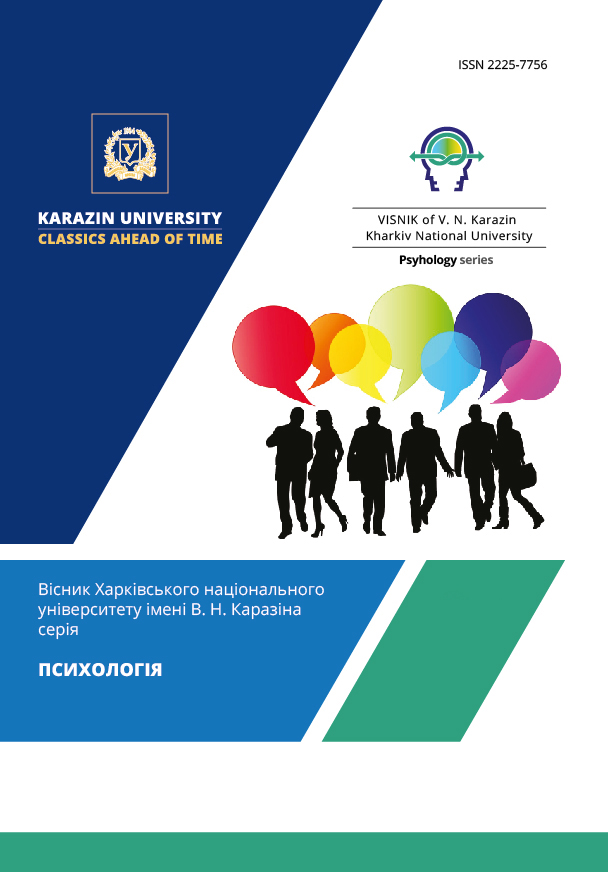PERSONALITY MATURITY AND SUBJECTIVE WELL-BEING IN STUDENTS OF FULL-TIME AND CORRESPONDENCE FORMS OF STUDYING IN THE UNIVERSITY
Abstract
The article contains the research of connections between personality maturity and subjective wellbeing in full-time and correspondence course psychology students. The concept of personality maturity is considered in terms of O.S.Shteppe’s and Yu.Z.Hilbukh’s approaches, the concept of subjective well-being is considered in terms of E. Diener’s hedonistic approach. For empirical study there were used such methods as Personality Maturity Questionnaire Yu.Z. Hilbukh, Personality Maturity Questionnaire O.S.Shteppe , Subjec tive Well-being Scale A. Perrudet-Badoux in V.N.Sokolova adaptation, Satisfaction with Life Scale E. Diener in D.O.Leontiev adaptation, Subjective Happiness Scale S. Lyubomirsky. The subjects of the research were second year students since this period can be considered the most stable of whole studying time. It’s revealed that the most psychology students have got acceptable level of personality maturity by Yu.Z.Hilbukh that is very high, high or satisfactory level. According to O.S.Shteppe the most of them have got required level of personality maturity. Students feel subjective well-being on emotional and cognitive level by average measure, they feel happy with their life by higher than average measure. Personality maturity in general is signifiantly correlates with subjective well-being in the emotional aspect and satisfaction with life as cognitive aspect of subjective well-being in students of both forms of studying. Also the tendency to form connection between personality maturity and feeling of happiness is revealed in full-time students. Correlations between com ponents of personality maturity and subjective well-being were obtained for full-time and correspondence course students separately. In full-time student’s different aspects of subjective well-being are more wildly connected with such components of personality maturity as motivation of achievement, self-acceptance and life philosophy.
In correspondence course students, aspects of subjective well-being are to more extent connected with components of personality maturity as contactability, tolerance and synergy. It can have argued that full-time students to feel emotionally comfortable need to have dispositions which regulate relations with themselves, but correspondence course students need to have dispositions which are demanded in communication and building ofrelationships.
Downloads
References
Елшанский, С. П., Ануфриев, А. Ф., Камалетдинова, З. Ф., Сапарин, О. Е. & Семенов, Д. В. (2016). Особенности позитивных личностных качеств у студентов разных форм и курсов обучения. Проблемы современного образования, 3, 51–58. https://cyberleninka.ru/article/n/osobennosti-pozitivnyhlichnostnyh-kachestv-u-studentov-raznyh-form-i-kursov-obucheniya
Кожухарь, Г. С. (2013). Личностные детерминанты переживания позитивных состояний и стресса у студентов-психологов. Психологическая наука и образование psyedu.ru, 2, 149–163. http://psyjournals.ru/psyedu_ru/2013/n2/61336.shtml
Манукян, В. Р., Трошихина, Е. Г. (2016). Современные психологические концепции благополучия и зрелости личности: области сходства и различий. Вестник Пермского университета. Философия. Психология. Социология, 2(26), 77–85. https://cyberleninka.ru/article/n/sovremennyepsihologicheskie-kontseptsii-blagopoluchiya-i-zrelosti-lichnosti-oblasti-shodstva-i-razlichiy
Орлова, Д. Г. (2015). Психологическое и субъективное благополучие: определение, структура, исследования (обзор современных источников). Вестник ПГПУ. Серия № 1. Психологические и педагогические науки, 1, 28–36. http://cyberleninka.ru/article/n/psihologicheskoe-i-subektivnoe-blagopoluchieopredelenie-struktura-issledovaniya-obzor-sovremennyh-istochnikov
Терехина, Н. С., Сергиенко, Е. А., Лекалов, А. А. & Звенигородский П. В. (2014). Взаимосвязь контроля поведения и субъективного благополучия людей различных профессий. Экспериментальная психология, 7(4), 52–65. http://psyjournals.ru/exp/2014/n4/72908.shtml
Шамионов, Р. М. (2008). Субъективное благополучие личности: психологическая картина и факторы. Изд-во «Научная книга». https://www.twirpx.com/fie/2346842/
Штепа, О. С. (2008). Особистісна зрілість: Модель. Опитувальник. Тренінг. Монографія. Видавничий центр ЛНУ ім. І. Франка.
Яворовська, Л. М., Філоненко, Г. С. (2014). Фактори становлення психологічного благополуччя особистості. Наука і освіта, 12, 216–220. http://nbuv.gov.ua/UJRN/NiO_2014_12_44
Ященко, Е. Ф. (2012). Самоактуализация и субъективное благополучие как социально-психологические проблемы профессионального образования: студенты и преподаватели университета. Вестник ЮУрГУ. Серия: Психология, 31, 56–63. https://cyberleninka.ru/article/n/samoaktualizatsiyai-subektivnoe-blagopoluchie-kak-sotsialno-psihologicheskie-problemy-professionalnogo-obrazovaniyastudenty-i
Chen, F. F., Jing, Y., Hayes, A. & Lee, J. M. (2013). Two concepts or two approaches? A bifactor analysis of psychological and subjective well-being. Journal of Happiness Studies, 14(3), 1033–1068. http://link.springer.com/article/10.1007/s10902-012-9367-x
Citations
Specifics of application of mathematical and statistical methods in studies of personal well-being in Ukrain
T. V. Danylchenko (2021) Scientific Herald of Sivershchyna. Series: Education. Social and Behavioural Sciences
Crossref




